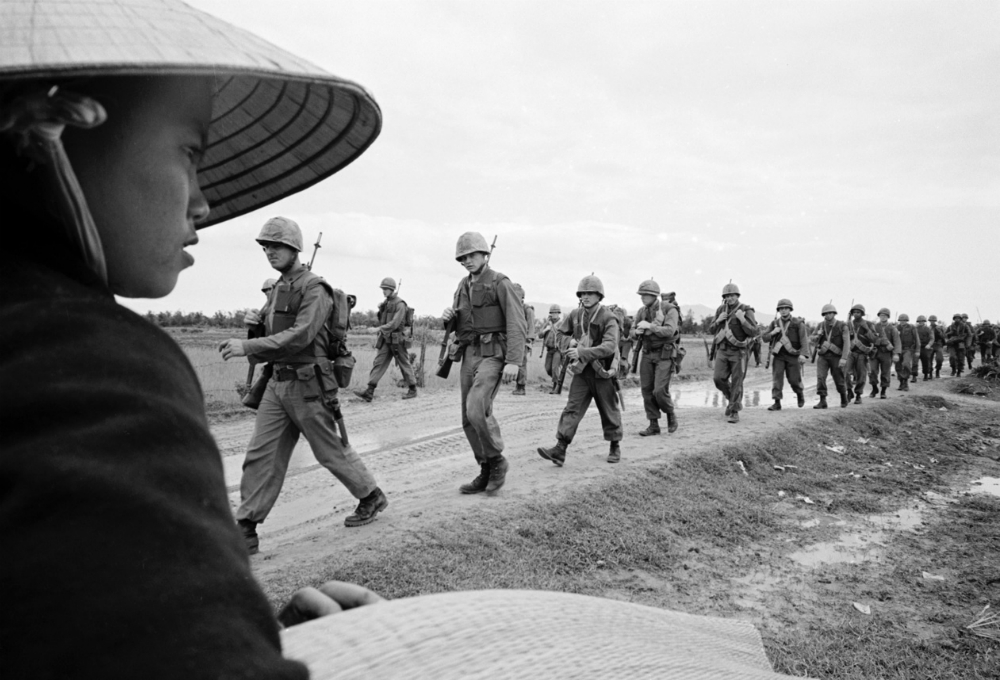
Marines marching in Danang, Vietnam, March 15, 1965 (PBS/Courtesy of Associated Press)
Asked the single most important lesson he learned working with Ken Burns and Lynn Novick during the preparation of "The Vietnam War," Marine veteran John Musgrave paused, then slowly and haltingly said: "I learned of the humanity of the people I killed."
On Sept. 8, Musgrave sat before a stunned audience of 3,500 in a theater in downtown Kansas City, Missouri. They had just encountered 70 minutes of riveting clips from the emotion-packed 10-part, 18-hour documentary set to begin Sept. 17 on public television, continuing nightly through Sept. 21. Episodes 6-10 will air Sept. 24-28.
That Burns and Novick found Musgrave, a humble poet, and highlighted his voice, allowing him to set a reflective moral tone to the narrative, speaks well of this collaboration and will add to their acclaim. This long-awaited documentary, which will undoubtedly rally critics, is an important contribution to the examination of both the Vietnam War and the unconscionably deadly impact of war in general.
The Vietnam War scarred and shaped a generation and led to deep social and cultural divides lasting to this day. It becomes vitally important that any retelling of the story, especially one likely to have historical impact, get it right. But to achieve such a goal when so many remain divided on the war's intentions, conduct and outcome seems an impossible task.
The filmmakers' answer is suggested by the motif, appearing on promotional literature, "There is no single truth in war."
They know the heavy burden they carry. "The Vietnam War," Burns said during a panel discussion following the preview showing, "is our most ambitious project."
He added: "Nothing compares to this film in terms of obligation and responsibility."
Burns is a filmmaking icon. He is one of our nation's preeminent storytellers, earning accolades through decades of richly layered documentaries. He is an idealist. Friends say his work is guided by his beliefs in the American ideals.
He first rose to prominence in 1990 with "The Civil War," a nine-part series that made him a household name. The documentary imposed black-and-white photos in a sound text of haunting fiddles. That the series' theme song, "Ashokan Farewell" by Jay Ungar, has been etched into our collective memory as associated with the Civil War speaks to the indelible impact of Burns' works.
Since then, his Florentine Films production company in Walpole, New Hampshire, has collected accolades for other works, including "Baseball," "Lewis & Clark," "Frank Lloyd Wright," "Jazz," "Mark Twain," "The War," "The National Parks," "The Dust Bowl," "The Roosevelts" and "Jackie Robinson."
It was in 2006, when Burns and Novick were finishing up their World War II documentary, that they realized the time was right to take on the Vietnam project. For one thing, after racing against the clock to interview the last of the World War II veterans, then in their 80s and 90s, they thought it wise to reach out to Vietnam veterans sooner rather than later. For another, they believed enough time had passed for tempers to have cooled and for less biased perspectives to have taken hold.
In the years that followed, they gathered funding and interviewed more than 100 subjects, most of them former U.S., North Vietnamese, South Vietnamese and Viet Cong combatants. They also sought the voices of anti-war protesters, former war journalists and others. Eventually they settled on some 70 voices.
They wove together their narrative, interspersing these voices with digitally remastered archival footage, celebrated war photographs, historic television broadcasts, home movies, and audio recordings from inside the Kennedy, Johnson and Nixon administrations.
The documentary features scores of iconic musical recordings from the era, as well as original music from Trent Reznor, Atticus Ross, and the Silk Road Ensemble featuring Yo-Yo Ma.
After wrestling with how to tell the story, the filmmakers decided with a bottom-up approach. They wanted to show the war through the eyes of ordinary people. They deliberately chose not to include the likes of Henry Kissinger or other war notables. They sought the advice of former presidential candidates and Vietnam War veterans John Kerry and John McCain, but left them out of the film.
At different points, they juxtapose the experiences of combatants who faced against off each other on the battlefields. We find time and age have mellowed these men. Their commitments to ideologies have waned and the bonds of shared experiences have drawn them together. U.S. and North Vietnamese soldiers are portrayed as vulnerable victims of rather callous and uncaring privileged men of power.
Advertisement
Film crews went to Vietnam four times in search of articulate voices. Their task was not made easier by Hanoi officials who continue to spit out old ideologies and leave little room for local dissent. Nevertheless, the filmmakers managed to find Vietnamese willing to break ranks and speak honestly.
These interviews are among the most revealing in the documentary. For example, one man, recalling the war, says, "We were told we were always victorious in the south. Each battle was a victory. Victory after victory. But, then, we wondered, 'Why aren't our sons returning home?' "
Some of the visuals have been dug out of little-viewed archives; others are familiar and have long been seared into the American war psyche. There's the scene of 9-year-old Kim Phuc, naked, crying, burned by napalm, and running with other children away from the smoke coming out of Trang Bang village. There's the unforgettable scene in Saigon during the Tet offensive, a picture that became emblematic of the atrocity of war, in which South Vietnamese Gen. Nguyen Ngoc Loan shoots a Viet Cong suspect point blank in the head.
Dong Van Mai Elliott, a Vietnamese who worked for the Rand Corporation during the war, speaks about having interviewed North Vietnamese and Viet Cong fighters and learning their motivations were not ideological, as was the Washington mindset at the time. Her contrary report uncovered commitments to national liberation, not communist ideology.
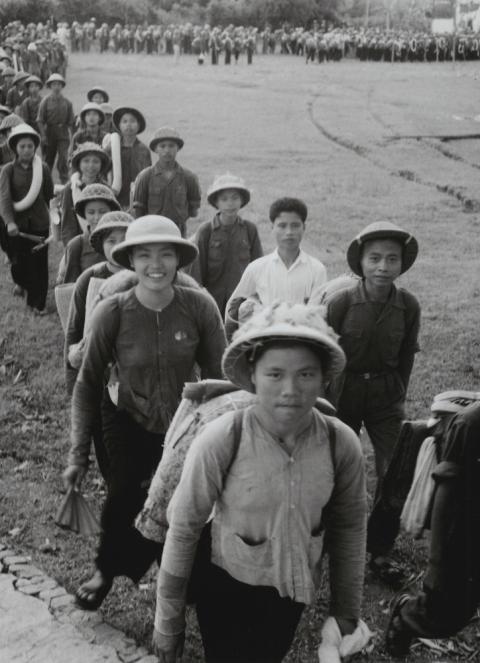
Young North Vietnamese join the Youth Shock Brigades Against the Americans for National Salvation. (PBS/Courtesy of Vietnam News Agency)
The implications were monumental, but didn't fit into policymakers' thinking at the time — and so were disregarded, with enormous consequences. One official who realized the importance of the findings told Elliott: "We're backing the wrong side."
The documentary points to mistake after mistake by Washington policymakers, each compounding and enlarging earlier mistakes, each invariably leading to greater tragedy, to more deaths and dislocation.
Burns likes to quote Mark Twain, the subject of another of his films. "Twain was supposed to have said that history doesn't repeat itself, but it rhymes. The problem is we never seem to learn."
Why not?
"It's human nature," Burns said the other night. "Human nature never changes. Only circumstances change."
However, Burns finds considerable hope in those who appear in his films, like Musgrave, who consistently seems to respond to the call of his better angels. Musgrave currently lives a modest life in Baldwin, Kansas, a town of 5,000, with his wife, four dogs and even more cats.
Musgrave wanted to serve his country as his father did in World War II. He responded with patriotic fervor, was seriously wounded and watched his fellow Marines risk their lives for him as he was dying on the battlefield. His story is riveting. He is at first triaged, left for dead, but miraculously awakens and returns home, disillusioned and full of remorse.
I telephoned Musgrave and asked him to elaborate on his conversion from war supporter to anti-war activist. He told me he grew lonely after returning home and felt he did not deserve to be alive, especially because his buddies who attempted to rescue him died in the process.
His love for fellow veterans remains as rich as his disdain for those who "callously send poor boys to war."
"I don't think they valued our lives at all," he told me. "They put the burden onto the working class. They thought we were valueless."
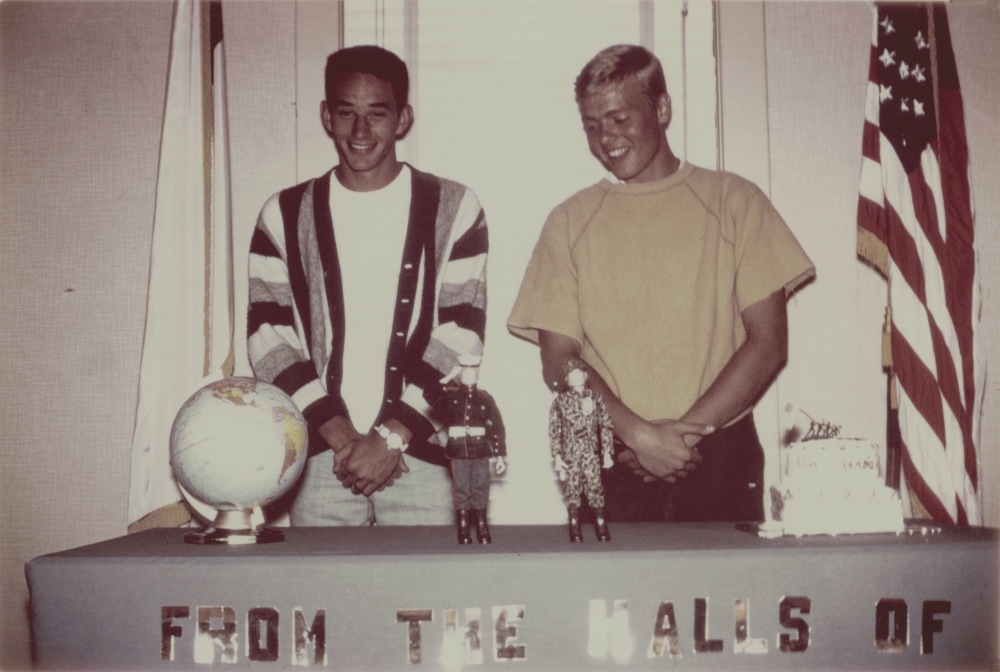
John Musgrave and friend about to enter the Marine Corps, Aug. 30, 1966 (PBS/Courtesy of John Musgrave)
Despairing and feeling unworthy to remain alive, one night he put his two dogs out on the back porch, took a 45-caliber pistol from his desk drawer, and put the barrel to his head.
"I was so overwhelmed by desperate sadness. I looked at my own survival as a burden rather than a gift. It was left for me to fulfill the sentence that had been pronounced on me in Vietnam. I wasn't thinking of what had been given to me, what a privilege it was to be alive, and responsibility I had to make something of my life."
As Musgrave prepared to pull the trigger, he heard his dogs scratching at the door to get back in. Those sounds shook him out of his mindless reverie and he put the pistol back in the drawer. He retrieved the dogs.
"They came back in as if they hadn't seen me in months, wagging their tails, licking at me. I was overwhelmed with a feeling of love."
In his newfound responsibility and after painful soul-searching, Musgrave began to speak out against the war, knowing it would hurt so many of the people who admired him. "It was the most difficult thing I ever did," he told me.
"It breaks my heart to see how effortlessly we continue to throw kids back into that hell, over and over and over again. They are the same kids that they fed into the furnace in Southeast Asia ... the same kids."
Musgrave says he hopes the film, which he thinks offers a meaningful portrayal of the war, will lead to better understanding and healing. "With knowledge comes healing. I can't imagine that this isn't going to begin a conversation that will be less bitter than the ones of the past."
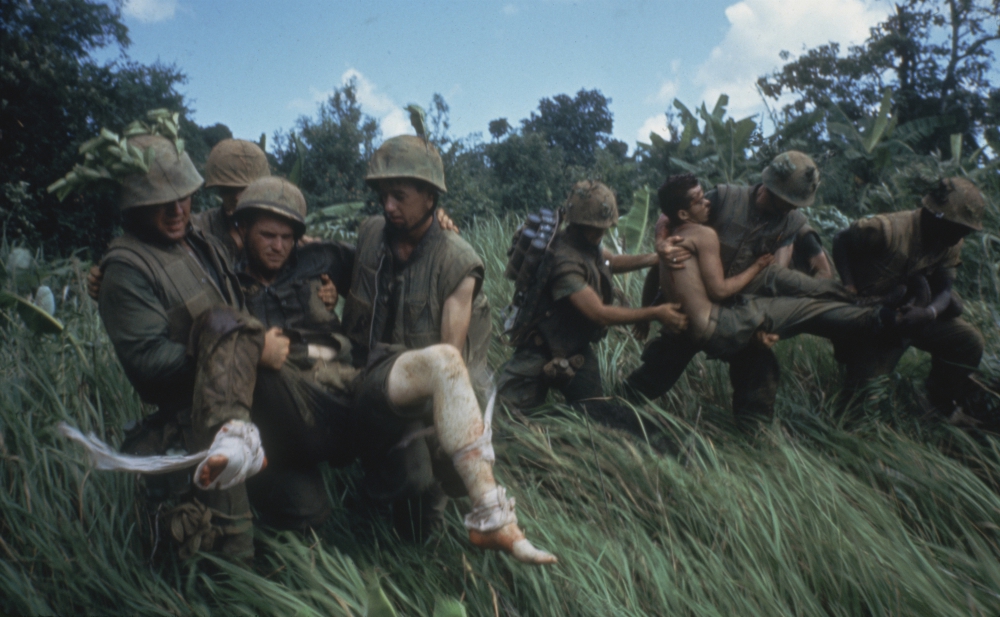
Marines carrying their wounded during firefight near the DMZ, 1966. (PBS/Courtesy of Getty Images/Larry Burrows)
Widening the lens
My personal criticisms of the series should be viewed in a context of admiration for what Burns and Novick have achieved. I offer them with reservations because I have not viewed the entire 18 hours of this epic work.
However large Burns and Novick's scope, I fear their lens has been too narrowly focused on the military aspect of the conflict and not wide enough to adequately digest all its bitter lessons. Yes, the title is "The Vietnam War." I would have preferred something like "Vietnam, America and the War."
The Vietnam tragedy, while primarily a military matter, was also an exhibition of American arrogance, racism and utter disregard for human life. It was a display of an indifference to the importance of culture, an indifference that came at great cost in Vietnamese and American lives.
Through a wider lens, it marked a clash of values; it was the result of often unspoken imperial designs. The lens as presented in the documentary, while accurate and gripping, could overlook some valuable lessons that need to be learned.
The primary military focus also underplays a wider American war impact on Vietnamese society, including a massive displacement of people. It leaves scant room for an understanding of the nuances of Vietnamese and American interaction at the time, for better and for worse.
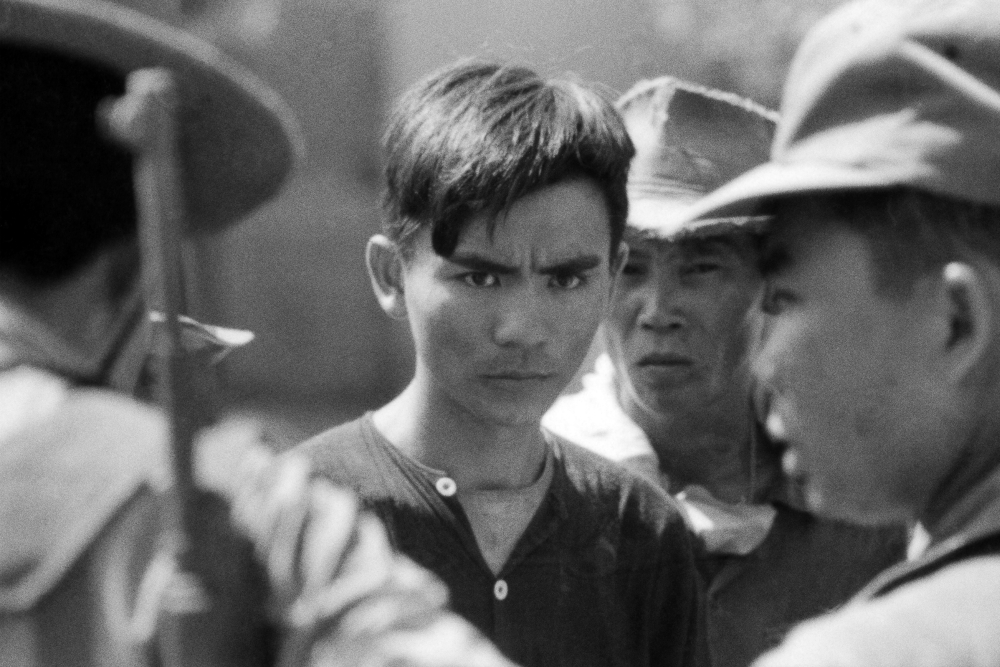
Vietnamese farmer detained for questioning, 1967 (PBS/Courtesy of Magnum Photos/Philip Jones Griffiths)
From my perspective, the war was more than a tragedy of compounded mistakes. It was also the result of an American disregard for Vietnamese history and culture. It was the result of arrogance and a belief in power of material wealth.
I wish the filmmakers would also have explored more widely the self-defeating corruption of the U.S.-supported Saigon government, a byproduct of a larger interplay between rich and poor.
There is, meanwhile, little mention of the roles played by U.S. civilians in Vietnam, including young idealistic volunteers (I was one). As counterpoint, they could have shown what it was like to befriend Vietnamese, not to fear them but to learn from them.
Exploring volunteers' experiences would have drawn light to the value of learning another language, exploring notions such as thinking within another mindset. It would have allowed for an exploration of cross-culture bonds. Following the war's end, for example, the first links between Vietnamese and Americans involved these former volunteers.
Without viewing the entire documentary, it is difficult to gauge whether these observations are mere quibbles or more serious flaws.
The documentary, if it does nothing else, speaks to the folly of war with the clarity of a lightening flash on a Kansas plain. As it stands, this Burns and Novick work of art sees war as a human calamity; it is a piercing look at the human family torn apart, in retrospect, by forces seemingly out of anyone's control.
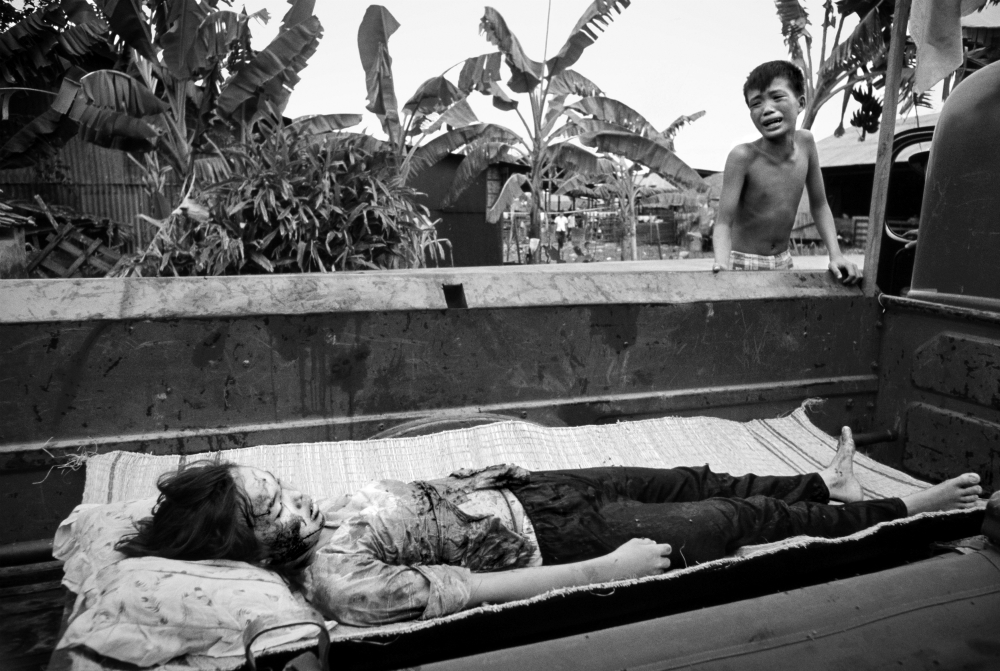
A 12-year-old girl killed in the May Offensive (Mini-Tet), 1968, in Saigon (PBS/Courtesy of Magnum Photos/Philip Jones Griffiths)
Fifty years later, the slogan at the time, "Better dead than red," makes no sense at all. The war makers are almost all dead; former combatants are now friends. The viewer is left wondering, "Can this kind of madness ever end?"
The madness of war is still with us. We are 16 years into the conflict in Afghanistan, a bloody stalemate in Iraq and Syria. We have, again, a president, a Pentagon and a Congress ready to boost defense spending to near-bankruptcy-inducing levels and for what purpose? What aim?
Let's hope "The Vietnam War" triggers the kind of conversations the filmmakers hope it will. Can it lead to a collective examination of conscience? Can it lead to a rethinking about war? Can it lead to reconciliation? Or is our fractured and often lost nation devoid of time and will to grapple with these thoughts? As a nation, we might be about to learn how dear to us remain the ideals of truth, reconciliation and peace.
[Thomas C. Fox spent five years in Vietnam during the war, working for International Voluntary Services and contributing to various publications, including National Catholic Reporter, Dispatch News Service, The New York Times and Time magazine. He is a retired NCR editor and publisher. He can be reached at thomascfox@gmail.com.]







